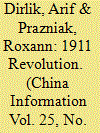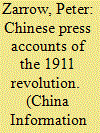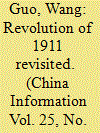|
|
|
Sort Order |
|
|
|
Items / Page
|
|
|
|
|
|
|
| Srl | Item |
| 1 |
ID:
110142


|
|
|
|
|
| Publication |
2011.
|
| Summary/Abstract |
The 1911 Revolution was a momentous event in bringing down the monarchical institution with a history of 2,000 years. Yet its consequences were ambiguous, it was overshadowed by the more radical revolution that followed in 1949, and it was stigmatized by the defeat of the Kuomintang, which claimed it as its own. Its 'revolutionariness' has been in question even as it has been celebrated as a turning point in modern Chinese history. This discussion reaffirms the revolutionary significance of the event, but also suggests that it is best viewed as a 'high peak' in a revolution of long duration that is yet to be completed. The current regime in China has revived aspects of monarchical culture and practices that revolutionaries sought to abolish in 1911. Most importantly, the promise of full citizenship for all that animated the 1911 Revolution remains unfulfilled, which may explain the contemporary regime's nervousness over the celebration of its 100th anniversary.
|
|
|
|
|
|
|
|
|
|
|
|
|
|
|
|
| 2 |
ID:
110145


|
|
|
|
|
| Publication |
2011.
|
| Summary/Abstract |
Both within and beyond China, contemporary reflections on the end of two millennia of imperial rule in China frequently focus upon the failure of the new republic to form a strong state and an effective parliamentary form of representative government. For many the agenda for political change in China today is traced back to unfulfilled opportunities in the past. This presentation suggests another set of perspectives that asks what political challenges were met in order to create a state ruling almost all the territory of the former empire, a transition unusual if not unique in the world history of empires, and how the manner in which those challenges were met influences the kinds of problems and possibilities China faces a century after the end of the last dynasty.
|
|
|
|
|
|
|
|
|
|
|
|
|
|
|
|
| 3 |
ID:
110143


|
|
|
|
|
| Publication |
2011.
|
| Summary/Abstract |
By examining how a particular story of events from October 1911 through to the abdication of the Qing imperial house in February 1912 was constructed, it is possible to suggest the effects of that story both as events unfolded and on subsequent historical consciousness. This article examines the coverage of the revolution in two newspapers, Shenbao, founded in Shanghai in 1872, and Dagongbao, founded in Tianjin in 1902. They were not necessarily representative of the press as a whole, much less public opinion, but they demonstrate different versions of the same essential narrative. The Shenbao story of '1911' told of struggle and triumph, culminating in the election of Sun Yat-sen as provisional president on 1 January 1912, which marked the founding of the republic. Dagongbao lacked triumphalism and was almost tragic in its reading of the revolution. Nonetheless, Dagongbao as much as Shenbao was quick to present a story of the transformation of 'chaos' into 'revolution' and finally into the republic (with the imperial abdication of 12 February). Both newspapers traced the revolution from the Wuchang Uprising, and the resulting narrative structure divided political time into before and after. That division is probably the essence of 'revolution'.
|
|
|
|
|
|
|
|
|
|
|
|
|
|
|
|
| 4 |
ID:
110144


|
|
|
|
|
| Publication |
2011.
|
| Summary/Abstract |
Reviewing the last decade of Chinese-language scholarship on the 1911 Revolution, this article suggests that we should view the Revolution in richer ways, rather than simply focusing on the political event on 10 October 1911. By contextualizing the revolution in its world, this article argues that it is necessary to view 1911 in its own terms and in global perspective in order to articulate historical continuities and discontinuities beyond 1911. How did, does, and will the spirit of modern revolution function and reshape the mental landscape in China's past, present, and future? The revolution is considered here to be not only a transhistorical source of transformation but also part of the restructuring of social life and ideals. Revolution has become the ontological ground of China's modern society. The meaning of the spirit of revolution lay in providing the Chinese people with a space of hope, where they could transcend current disappointment and discontent, and pursue political, economic, and cultural visions to fundamentally change their world. For individuals, revolution offered a means of meeting personal needs; for the nation, the revolution has meant the unending pursuit of 'standing up, enriching up, and strengthening up'.
|
|
|
|
|
|
|
|
|
|
|
|
|
|
|
|
|
|
|
|
|